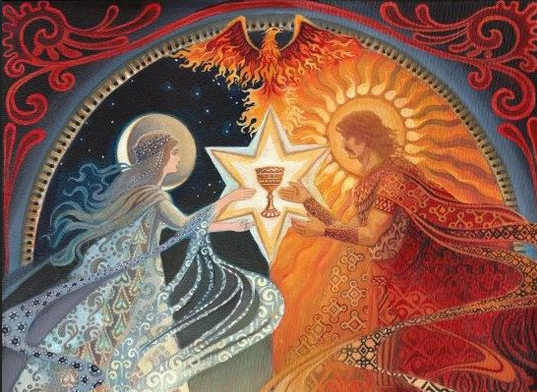
BY NOW, it’s pretty obvious that I am a big fan of Carl Jung. In an earlier post, I spoke about the Shadow, the collective name for those parts of our psyche that become consigned to the unconscious for reasons of conditioning or trauma, to name but a few. Fortunately, through the self-healing process of individuation (or psychosynthesis), a person could painstakingly reassemble their fragmented psyche into an integrated whole. A satisfying never-ending journey not for the faint-hearted. Jung spoke of yet another aspect of the psyche, that is not entirely separate from, yet distinct from, the Shadow. He called this the Anima/Animus.
For a woman, the Animus represents those parts of her psyche that are regarded as masculine and have been repressed since childhood, such as confidence and leadership, while for a man, the Anima represents the feminine, repressed parts of his, such as compassion and intuition.
So for instance, speaking only of my generation and coming from a mixed-sex school environment, girls were raised not to stand up for themselves and put other people’s, especially men’s, needs over their own, so typically, a little girl might grow up as a pleaser with low self-esteem. Boys on the other hand were taught to act tough, suppress their emotions and fight their way out of difficulty, so typically, a little boy might turn into a bully with an over-inflated opinion of his abilities and who does whatever the hell he wants. I am, of course, generalising – the reality was far more nuanced.
Carl Jung believed that when it comes to peeling back the onion layers of the unconscious, the Anima/Animus is stored in the very deepest recesses and so represents the final stage in the individuation journey once the Shadow stage is complete. However, I have found the two to be interchangeable and the work on both to be in parallel. The extent to which the Anima/Animus is distinct from the Shadow may well depend on the environment into which a person is born. Gender-based expectations were more pronounced in Jung’s time, so it would follow that the personal journey that informed the bulk of his research is coloured accordingly.
Jung also did not account for greyer areas in sexual identity and it is generally recognised in therapeutic circles nowadays that both men and women exhibit/repress both anima/animus traits. If Jung were to time travel to the present, he would almost certainly have to revisit many of his assumptions. The key is not to take his ideas too literally.
Of course, the notion that men and women are fundamentally different has been around for millennia. With the advent of Christianity, the onus was on women to be ‘saints’, while men had carte blanche to be ‘sinners’ if they felt so inclined and as long as nobody was looking. Scientific dogmas for gender difference are more recent – Men are from Mars and Women from Venus seemed to knock on the head once and for all any ideas I had that men and women were sexual equals. Based on what I know now about the part conditioning plays in identity and behavioural development, it turns out that I may have been right all along, and we are in fact all a dizzying cocktail of what we might term ‘masculine’ and ‘feminine’ qualities. Just as ‘good’ and ‘evil’ are man-made, so too are gender behaviours. There are indeed natural differences but these are far more subtle that we have been led to believe.
The end result of generations of societal cherry-picking is that noone but noone operates on full capacity. If for argument’s sake we say that we exhibit 50% of our full potential (chances are it really is 10%), then you can see how so many people feel a gaping void and the concept of a missing other half arises. As harsh as it sounds, putting all the hormonal, physical aspects of biological sex to one side, when we fall in love, we are in fact falling for the missing parts of ourselves whom the object of our desire just happens to best represent. This is the X-factor, that thing you cannot put your finger on and why when they say “It’s not you, it’s me”, they really do mean it (though it doesn’t seem that way at the time).
So if Jung is right, then romantic love as we have come to know it is nothing more a societal construct, a projection, the outcome of millennia of conditioning. Yes, boooooooooo!! Romantic love would not exist if we were whole.
Much is currently made of the Patriarchy that has held sway for what seems like an eternity across the world. What tends to be overlooked is that both sexes have been hammered into conformity. Even in these crazy times, what is exciting is that men and women have an opportunity to liberate themselves from centuries of bullshit and rediscover the truth of their entire being.
We are the One.